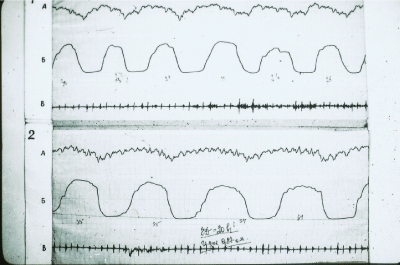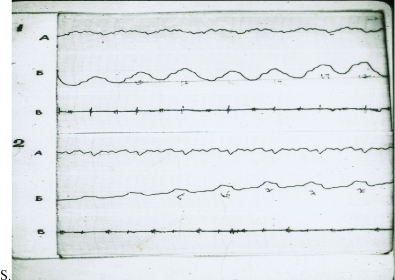
Figure 1: Rheogram of ventilation of the patient 8 years,AP - 7-10 segments on the right lung.
1-the source rheopulmonography(RPG).
2-RPG after cupping therapy.
A-differential RPGs.
Б-Main RPG.
В-phonocardiogram.


Igor Klepikov*
Pediatric Surgeon, 2116 27th St. NE Renton, WA, USA*Corresponding author: Igor Klepikov, Pediatric Surgeon, 2116 27th St. NE Renton, WA, USA, E-mail: igor.klepikov@yahoo.com
Comparative reopulmonography was used for objective assessment of therapeutic effect of cupping therapy in patients with acute pneumonia. Studies were conducted in the initial period of the disease in 14 patients. The results showed high efficiency of this procedure.
Acute Pneumonia; Cupping Therapy; Comparative Rheopulmonography
Cupping therapy (CRT) has been known for many centuries. It has been used and continues to be widely used in the world [1]. However, this type of assistance refers to the section of alternative medicine [2], and therefore official medicine does not include the CRT in complex clinical care, and academic science pays no attention to it. Ongoing research and controversy about the effectiveness or ineffectiveness of the CRT, as a rule, are based on subjective feelings and experiences of patients [3-7]. In this regard, research conducted many years ago by the author of these lines still remain relevant [8,9].
The research was conducted in the clinic of pediatric surgery (Novokuznetsk, USSR) in 1982-1985 in patients with severe forms of acute pneumonia (AP) in the initial period of the disease. At that time children with the most aggressive forms of AP were selectively admitted to our department. The reason for the hospitalization was the fact that the surgical clinic was the only place in our area for intensive care. This group of patients differed high mortality and fast development of pleural complications. Unsatisfactory results of conventional treatment (massive doses of antibiotics, oxygen supply, and intravenous infusion) led us to seek solutions to problems.
CPT was used as one of the first aid procedures on the methodology of Fire Cupping. The cups imposed only on the area of the back of the calculation of 1 cup (50 cubic centimeters) to 4 kg body weight. Preliminary positive, but empirical experience in applying CPT with the AP pointed to the need to find an objective evaluation of their actions.
The effectiveness of procedures was evaluated by using comparative rheopulmonography (RPG). Record indicators was carried out prior to and immediately after the procedure. The electrodes for recording were applied on the side of the chest wall at the level of 3-4 ribs. Electrodes remained in the same place for the implementation of re-recording. Recording was carried out on the RPG-4 unit, “Elkar” (USSR).The age of patients these studies ranged from 3.5 to 14 years. Comparative RPG parameters were recorded in 14 children after the CPT.
Comparative RPG allowed to evaluate the respiratory rate (RR), respiratory volume (RV), minute volume of ventilation (MV), heart rate (HR), systolic wave amplitude (SA), minute pulsatory blood flow (MBF), coefficient of ventilationperfusion ratio( Kv/p).The results were subjected to statistical processing.
If we stick to the view that CPT is characterized as pseudoscience [2], there is no reason to start any research in this area and forget about this method. But then we must forget the centuries-old experience of application of CPT and ignore the laudatory reviews many patients about this technique. While the official medicine and science is experiencing serious difficulties in solving the problem of acute pneumonia.
“Pneumonia is a leading cause of hospitalization among children in the United States, with medical costs estimated at almost $1 billion in 2009. Despite this large burden of disease, critical gaps remain in our knowledge about pneumonia in children [10]. “The rates of parapneumonic effusion have been increasing in the USA and Europe over recent years, and it is now encountered in approximately 40% of all patients with bacterial pneumonias” [11]. “Pediatric pleural empyema has increased substantially over the past 20 years and reasons for this rise remain not fully explained” [12].The above quotes indicate low efficiency of the modern treatment of acute pneumonia (AP) and the absence of an explanation for this fact. Such a situation implies the search for new solutions to the problem.
In such a situation, it is necessary to look for ways to solve the problem. One of the possible directions of this work may be a scientific explanation of therapeutic effect of methods of unconventional medicine. Among these techniques CPT has enough widespread use at the pre-hospital stage.CPT is used at many diseases, which differ by their nature. This procedure use most often when various pain syndromes and evaluation of its effectiveness is determined by the opinion of patients [3-7]. On the basis of this assessment Vaskilampi T and Hanninen O [4] consider only the psychological effect of CPT and Ahmadi, A. Schwebel, D.C. and Rezaei, M [13] placebo effect. Changes in some laboratory parameters due to CPT already can be seen as an objective criterion [14,15]. The object of the present study was only patients with AP. The aim of the work was the search for objective assessment of visible clinical effect of CPT.
Comparative RPG study were objective evidence of the effectiveness CPT. Thus, indicators of RR and MV significantly decreased after the procedure, although RV remained unchanged. Performance SA, MBF has changed markedly, HR decreased to a lesser extent. In general, the received data reliably indicated a decrease of hyperventilation and improving perfusion. Baseline RPG indicated marked predominance indicators ventilation over the bloodstream. Following treatment procedures, the ratio between these parameters (Kv/p) align. This point was accompanied by a significant improvement in the condition and well-being of patients.
Despite the undoubted effectiveness of CPT in the initial period of AP, unambiguous explanation of the mechanism of its action is difficult. These difficulties are attributable to the following fact. Comparative RPG was recorded before and after cervical vagosympathetic blockade (CVB) in 22 children with AP.CVB performed with 0.25% solution of Novocain on the side of inflammation in lung. These blockades were mainly recommended for carrying out differential diagnosis between abdominal syndrome of AP and acute appendicitis in children (in the Soviet Union, where the work was performed).CVB is aimed at neurogenic isolation the inflammatory hearth and removing its reflectoric influence on other structures. At its core, CVB is fundamentally different from CPT, however, results after CPT and after CVB were almost equivalent.
The obtained results allowed us to evaluate the mechanisms of the development of the disease process in AP from new positions. Suddenly emerging center of inflammation causes reflectoric respiratory frequency excursions. Simultaneously reflectoric spasm of vessels in pulmonary circulation impedes the blood flow and causes delay and disruption of blood perfusion on the periphery. Violation of metabolic processes is the next link after the changes in the systemic circulation. Metabolism perversion serves as an additional incentive to compensatory increase in ventilation. Therefore, according to the original RPG, ventilation rates prevailed over the blood flow rates (Kv/p more than 1).
Cups application extracts part of circulating blood and reduces venous return. This step unloads the vessels of the small circulation. Perhaps CPT is providing additional positive reflectoric effect on pulmonary vessels and removes them from spasm. Therapeutic effect of CPT still needs further clarification. To date, however, another fact is evident. This procedure is one of the important pathogenetic treatments AP. A visual representations of change records RPG under the influence of СPT gives a comparative picture of these curves, which were recorded from one of our patients (Figures 1 and 2).

Figure 1: Rheogram of ventilation of the patient 8 years,AP - 7-10 segments on the right lung.
1-the source rheopulmonography(RPG).
2-RPG after cupping therapy.
A-differential RPGs.
Б-Main RPG.
В-phonocardiogram.

Figure 2: Rheogram of pulsatory blood flow of the same patient. The designations are same
1-the source rheopulmonography(RPG).
2-RPG after cupping therapy.
A-differential RPGs.
Б-Main RPG.
В-phonocardiogram.
And another fact deserves attention. Modern medical technologies allow getting an objective evaluation of the therapeutic effect and help to develop the scientific understanding of the little known disease mechanisms. Expert assessment of the quality of care on the basis of sensations and impressions today seems unprofessional and unconventional. Such a method of assessment does not give grounds for the verdict that CPT refers to pseudoscience [2]. Everything is just the opposite: Medical science should admit their incompetence in this section and the lack of objective scientific research CPT.
Download Provisional PDF Here
Article Type: CASE REPORT
Citation: Igor Klepikov (2018) Cupping Therapy as a means of First Aid in Acute Pneumonia. J Clin Case Stu 3(2): dx.doi. org/10.16966/2471-4925.165
Copyright: © 2018 Klepikov I. This is an open-access article distributed under the terms of the Creative Commons Attribution License, which permits unrestricted use, distribution, and reproduction in any medium, provided the original author and source are credited.
Publication history:
All Sci Forschen Journals are Open Access